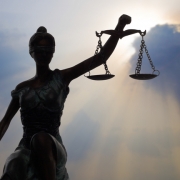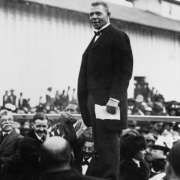On nurturing children, we “should well study their natures and aptitudes and see, by often trials, what turn they easily take and what becomes them, observe what their native stock is, how it may be improved, and what it is fit for.” This attitude could have been expressed by the renowned educator and Poetic Justice Warrior Maria Montessori, but it is not hers. However, it is a radical shift away from the Renaissance emphasis on Classical Greek philosophy, and toward the Enlightenment view of human beings as unique individuals.
For insight on personal liberty and self-reliance,
If man in the state of nature be so free, as has been said; if he be absolute lord of his own person and possessions, equal to the greatest, and subject to no body, why will he part with his freedom? Why will he give up this empire, and subject himself to the dominion and control of any other power?
This sentiment might easily be attributed to Poetic Justice Warriors Booker T. Washington or Ayn Rand, but it is not theirs. It was however a radical shift away from the notion of the divine right of kings. And it was the precursor for the Great Upheaval of the late 18th century, the one that resulted in a brief experiment with enlightened despotism in Russia, a brutal and failed revolution in France, and according to President John Adams, the successful revolution of the mind to supplant British hegemony in America.
The source of the first quote is Some Thoughts Concerning Education, published in 1693; and the second is from Two Treatises of Government, published in 1689. Both were achievements of Poetic Justice Warrior John Locke. These were truly radical ideas at the time, and they furthered the course of human history toward human flourishing.
All the King’s Men
In 17th century Europe, the feudal system had largely replaced slavery. While serfs had a few basic rights such as access to the legal system, some freedom of movement and church sanctuary, they lived lives of servitude. In England, there was a great deal of political pressure, particularly from the Whig movement, to replace the absolute monarchy of King Charles II with a constitutional monarchy that would limit the authority of the sovereign. Locke had a long and close relationship with a founder of the Whigs, Lord Ashley, for whom Locke and his team of doctors had saved from liver disease by performing surgery.
Because of Locke’s implication in a plot to assissinate King Charles II (there is little evidence that Locke was involved), he exiled himself to the Netherlands for five years in 1683 (or be hung, drawn and quartered). It was during this time in Amsterdam that Locke surrounded himself with the intellectual heirs to the rationalist philosophy of Baruch Spinoza, and in particular Spinoza’s philosophical treatise titled Ethics. While there was conflict between Locke’s empiricism and Spinoza’s rationalism, Locke was impressed with Spinoza’s arguments regarding political and religious tolerance, and the separation of church and state. This period also gave him time to complete his signature achievements – Two Treatises of Government, An Essay Concerning Human Understanding, and A Letter Concerning Toleration.
Back in England, there was increasing resentment against a Catholic monarch wielding absolute authority justified by the divine right of kings. In 1688, the Glorious Revolution led by English parliamentarians and an invading Dutch fleet and army organized by the Prince of Orange, installed a constitutional monarchy led by William III and his wife Mary II. It was then that Locke, accompanied by Mary II, returned to England. The following year the English Bill of Rights was passed by parliament and Locke finally published his Treatises, Essay, and Letter. While Locke was associated with the Whig party that controlled parliament, his conception of natural rights (rights not derived from any law or government) were still considered radical at the time.
The Road from Serfdom
Locke’s Two Treatises of Government contain powerful arguments for limited government, separation of powers, and the consent of the governed. But he is not the first to espouse these ideas. According to historian Peter Berkowitz, they can be found in much earlier work. For example, the Bible talks about equality, but it is not based on natural rights. And in classical Greek philosophy, political structures should accommodate human virtues, not personal liberty. It was John Locke who combined seemingly unrelated ideas into a cohesive framework that coalesced into America’s Declaration of Independence and Constitution nearly a century later.
It starts with Locke’s theory of knowledge, known as Tabula Rasa in Latin, meaning that all human beings are born without innate ideas. He asserts that all people acquire knowledge through perception, experience, and introspection. This idea can be traced back to the 11th century Persian philosopher Avicenna, and before that to Aristotle. His theories on education consider the mind and body to be one integrated system, that children should be considered rational beings, and that virtue is taught by delaying gratification. Locke adds to this his theory of every person’s sense of self, or individualism:
Thus, from the consideration of ourselves, and what we infallibly find in our own constitutions, our reason leads us to the knowledge of this certain and evident truth, that there is an eternal, most powerful, and most knowing being; which whether any one will please to call God, it matters not!
This naturally leads to the right of each human being to ownership of their life and property. As Berkowitz explains about Locke’s achievement, political power is rooted in freedom and equality by and for all. For political systems to be legitimate, they must protect natural rights, and it must be by the consent of the governed. Locke proved that no one is born to rule others, and no one is born to serve rulers. But freedom and equality are not absolute, political structures should only protect their citizens from the threat of force imposed by others.
As poetic justice would have it, Locke’s Two Treatises laid dormant in western political thought until the American resistance against British taxation resurrected it. Personal liberty became the subject of debates in both America and Britain, and in 1773, Two Treatises of Government was finally published in America. Consequently, it had profound influence on Alexander Hamilton, James Madison, Thomas Jefferson, and the other great American political philosophers that triggered Adams’ revolution of the mind, and fostered the soul of America.













